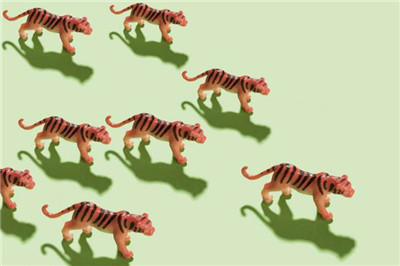(单词翻译:单击)
1. WE'RE NURTURERS BY NATURE …
1. 我们是天生的养育者
In 1943, Nobel Laureate Konrad Lorenz, one of the founding fathers of ethology (animal behavior), proposed that features like a rounded head, small size, and big eyes-what are called neotenic, or baby-animal, characteristics-promote parental care. This nurturing response can serve to enhance offspring survival, and has been described as a fundamental function of human social cognition. Recent studies have extended the concept of cuteness to auditory and olfactory cues (baby laughter, or that amazing new baby smell) that prompt affection and caregiving.
1943年,诺贝尔获奖者康拉德·诺伦兹(动物行为学的创始人之一)提出了有着圆头、大眼睛、小尺寸特征的新生儿或小动物会让人们产生保护欲。这种养育反应促进了后代的生存,被描述为人类社会认知的基本功能。最近的研究已经将可爱的概念拓展至听觉和嗅觉信号(婴儿的笑声或婴儿的奶香味),认为这些信号或能促进感情、让人们产生照顾欲。
Interestingly, some research suggests that we don't just think that small things are cute, but also that cute things are smaller than their actual size. For instance, mothers misperceive their youngest kids as much shorter than they are in reality, an illusion that may result in their allocating greater care and resources to the last-born child.
有趣的是,有些研究认为我们不止认为小东西很可爱,而且还认为萌物的尺寸比它本身还要小。例如,母亲总会误以为孩子的身高比实际上更矮,这种错觉可能会导致他们给予最小的孩子更多的关爱。
2. … AND SMALL THINGS MAKE US ACT WITH CARE.
2. 小东西会让我们小心行事
Cuteness motivates us to protect the object of our affection, turning us into focused, gentle caretakers. In a 2009 study, scientists reported that participants that viewed very cute images of puppies and kittens performed better in the children's game Operation than participants that saw less cute images of dogs and cats. Subsequent research, by Hiroshi Nittono and his colleagues at Hiroshima University in Japan, found that cuteness improves our performance at times when we need to be careful: Flimsy tiny furniture and other miniature collectibles may seem cute because we know that they could break unless we handle them delicately.
我们会对喜爱的萌物产生保护欲,所以会变成专注的、温柔的照看者。在2009年的一份研究中,科学家报道:看猫和狗可爱照片较多的受试者,在儿童比赛Operation中的表现更好。Hiroshi Nittono及其同事在日本广岛大学开展的后续研究发现:可爱会让我们更加小心。脆弱的小家具和其它微型收藏品看起来非常可爱,因为我们知道如果不轻拿轻放,它们就有破碎的可能。

3. WE LIKE THAT THEY CAN'T HURT US.
3. 我们喜欢它们,因为它们不会伤害我们
Cuteness in human infants has been linked to their helplessness. Small objects, by virtue of their size, tend to pose little danger. "One of the critical features that make a thing cute is the absence of feeling threatened. Small things are likely to meet this condition," Nittono tells Mental Floss.
小宝宝很可爱,这可能与它们的无助感相关。小的东西往往不会构成威胁。"萌物最显著的特点之一就是它们没有威胁感。而小东西正好符合这一特征,"Nittono对Mental Floss说道。
4. WE LOVE TOYS, NO MATTER OUR AGE.
4. 我们喜欢玩具,无论年龄
Cuteness extends to inanimate objects such as dolls and other toys. Teddy bears have changed over time to look cuter and more baby-like. Miniatures may look cute, in addition, because we connect them with toys and child play. Because young children are cute, their toys and other possessions may become cute by association.
玩偶和其它玩具也很可爱。随着时间的推移,泰迪熊已长得越来越萌、越来越像宝宝。此外,微型模型也很可爱,因为我们会将其视作玩具,和宝宝一起玩。因为小朋友很可爱,所以他们的玩具和其它物品也会因为我们的爱屋及乌而变得可爱。
译文属可可原创,仅供学习交流使用,未经许可请勿转载


